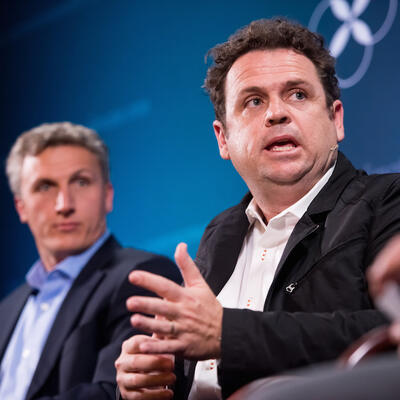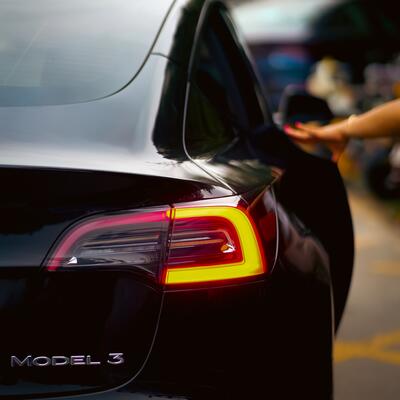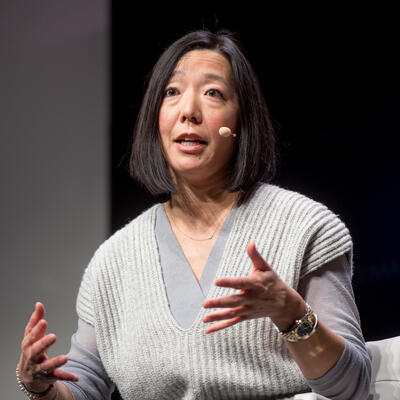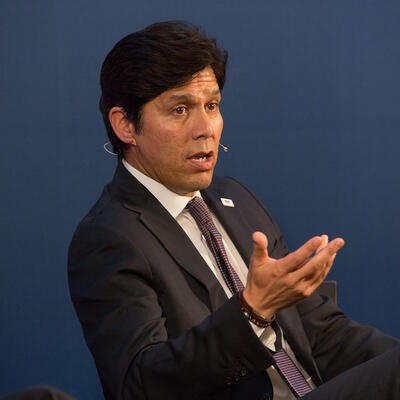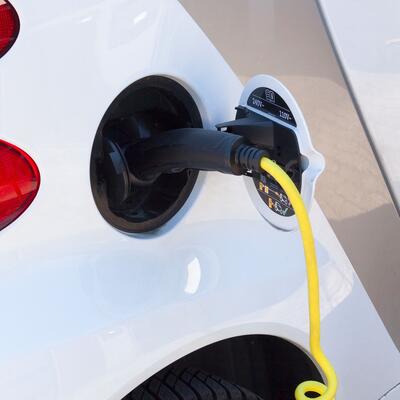
Today's EV Market
Guests

Sherry Boschert

Eileen Tutt
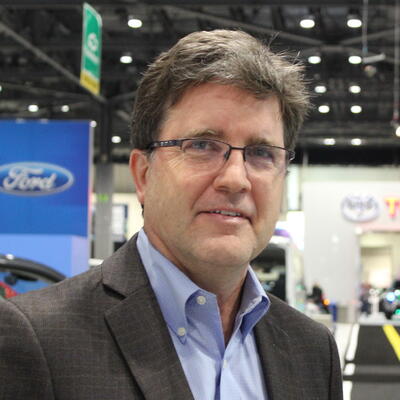
Charlie Vogelheim
Summary
Today’s electric cars are more fun to drive than ever. And for many, they’re more affordable too. Will California reach its goal of a million EVs by 2020?
Sherry Boschert, Co-founder, Plug In America; Author, Plug-in Hybrids: The Cars That Will Recharge America (New Society, 2006)
Eileen Tutt, Executive Director, California Electric Transportation Coalition
Charlie Vogelheim, Principal, Vogelheim Ventures
This program was recorded in front of a live audience at the Commonwealth Club of California on February 24, 2016.
Full Transcript
Greg Dalton: New car sales are setting records and today on Climate One we will discuss how electric vehicles are faring in a market fueled by cheap gas. I'm Greg Dalton. And when EV's came into the mainstream market five years ago, I recall EV enthusiasts predicting sales would quickly take off. But just as the cars started getting traction, the floor fell out of the oil market, sending gas prices to levels not seen since the great recession. That's hurting EV sales. Last year, sales of cars with the plug that run partly or entirely on electricity fell 5% from the year before, while total car sales hit an all-time high.
Over the next hour we will look into the history and the future of electric cars in the United States and abroad. Scientists say and many government experts say that to stabilize the climate that supports the economy, Americans need to get off oil that is driving severe weather. Moving to electric cars that run on sun or wind is one way to do that. And as anyone who has driven an electric car can attest, it's an exciting driving experience. EVs are simply fun to drive, regardless of their virtues that might impress your mother or your neighbor.
We’re pleased to welcome three EV experts to talk with our live audience here at the Commonwealth Club today. Ten years ago, Sherry Boschert wrote a book titled Plug-in Hybrids: The Cars That Will Recharge America. She’s a cofounder of Plug in America, an advocacy group. Eileen Tutt is Executive Director of the California Electric Transportation Coalition, a group of companies in the electric vehicle industry. She’s a former Deputy Secretary of the California EPA. And Charlie Vogelheim is host of Motor Trend Audio, a weekly podcast. He formally was Vice President of J.D. Power and Associates, an editor at Blue Book. Please welcome them to Climate One.
[Applause]
Sherry Boschert, why don’t you give us a quick history lesson. In the 1990s, California decided the regulators decided they should push something called zero emission vehicles. And from that chapter to about 2011 there were what, six or seven thousand of those cars sold. So give us a quick historic foundation and you live through that era.
Sherry Boschert: Sure. And the reason this is important, the California Air Resources Board started requiring carmakers to make cleaner cars if they wanted to keep doing business in our state. That is one of the reasons we have these cars today. The car companies didn't want to do that. One of the other reasons is that consumers have been pushing them. But to give you a sense of the back-and-forth and how long this has taken. In 1990, General Motors displayed an electric vehicle called the Impact, not a good name. They later called it the EV1 electric car.
Having shown that they could build an electric car even though it was sort of a concept, the California Air Resources Board then required the top seven automakers to make 2% of their sales in the state be zero emission by 1998, 5% by 2001 and 10% by 2003. We’re nowhere near that right now, but those are really great goals and it freaked out the car companies completely. In 1991, 19 states adopted parts of California's regulations. So now you’ve got a movement that really is pushing car companies. Chrysler was the first to deliver a zero emission vehicle in 1993, but the big three GM, Ford and Chrysler, sued New York and Massachusetts to fight the zero emission vehicle mandate.
Lawsuits went on went back and forth. The Western States Petroleum Association started hiring fake people to go complain about the zero emission vehicle mandate. The car companies fought back. They kept suing in the early 2000's the Bush administration, you know, basically backed the car companies. And the California Air Resources Board decided that they had to water down the regulations, that they couldn't keep up the fight or that there was the potential to lose. And so in 2003 they did, in 2001 the Air Resources Board cut the zero emission vehicle mandate to 2% of sales and they kept scaling it back and scaling it back.
Greg Dalton: There was a movie made about this which people can watch, the sort of the electric car kind of got pushed and then killed right. And then we get to 2011 where there’s a new generation of electric cars that comes onto the market, right?
Sherry Boschert: Yeah. And if you haven't seen the movie Who Killed the Electric Car? It tells the whole story and even if you’re not a car person it frames it as a murder mystery. Who killed the electric car, was it the Air Resources Board backing down, was it the car companies, was it the oil companies that consumers not want them or did hydrogen fuel cell cars distract everyone. So it's a really entertaining movie and was followed by another movie called Revenge of the Electric Car, when the electric cars came back. A lot of that and my book gives you a lot of background that explains why we’re where we’re at today, you know, we have the cars but not as many as we should, and we need to keep pushing and government regulators need to keep pushing.
Greg Dalton: And there’s something there you said that we’re below, even where people, this started 25 years ago and there where, the markets share of electric cars today is below where regulators wanted to be 15 years ago. And sales have been less than some people were predicting even five years ago. I want to show a clip of a former regular, Anthony Eggert was here five years ago when he was at the California Energy Commission and this was a scenario this was not a projection, but this is what some people were thinking about where we would be, you know, now or so nearing 2020 for electric cars. So let's listen to Anthony Eggert from the California Energy Commission five years ago.
[AUDIO PLAYBACK]
Anthony Eggert: We looked at I would say an optimistic scenario of potentially a million vehicles here in the state by 2020. And I think that is plausible, but it's very aggressive.
[END AUDIO PLAYBACK]
Greg Dalton: Million vehicles by 2020. Eileen Tutt, where are we today in California?
Eileen Tutt: We have about 160,000 vehicles and so we have four more years to do 840,000 vehicles. And that took us almost 5 years to get to that 160. So I think I believe we can make it to a million, but I think the challenge right now is all about what you said in the opening comments Greg, the gas prices. The fact that you can get gas at two dollars a gallon is really, really hurting this market. And I don't see that changing anytime soon but I guess I'm still hopeful that we’ll get close to a million. I think it's great to have that good target. And I want to point out that I think what we’re doing in California, the zero emission vehicle requirement from the Air Resources Board is very important, but we also have incentive programs. So can I just ask who in this audience here in this studio owns or leases an electric car? Okay, so about half.
Greg Dalton: Half of the people.
Eileen Tutt: Yeah, about half of you. For those of you that don't, those out listening online or wherever you're listening -- the state offers incentives. The federal government offers very generous incentives. There's something called the low carbon fuel standard where your utility will give you money on your utility bill if you tell them you have an electric vehicle and you plug it in at home. So your electricity costs are reduced. There are HOV lane, so if you're in a congested area and you want to get into a shared, you know lane, where usually you’d have to have two or more people in the car you can get a sticker if you own an electric car in California.
So in this state the mandate or the requirement on automakers is one component but I think part of the reason we’re succeeding this time where we didn't succeed last time, is because the state government in all, you know, at the Public Utilities Commission, at the California Energy Commission, at the Air Resources Board and now the Federal Government. Everybody's pulling together to try to encourage consumers to make, you know, the greenest choice out there which is a plug-in electric vehicle.
Sherry Boschert: Can I add one thing too which is education. Consumers still don't understand plug-in cars and how much they save. I mean, when I wrote my book, gas averaged $2.50 a gallon and at that price, driving a mile cost you $.13. On the average rate of electricity it costs $.02 to $.03 to $.04. So you’re saving so much more, I have an acquaintance who commutes from Pacifica to San Francisco every day and her car was dying. She leased a Nissan Leaf for less than the cost of what she was spending on gasoline. She basically got a free car. So if more people knew that and understood that, it would look more appealing.
Greg Dalton: Charlie Vogelheim, you are one of the few people in the country that probably driven all of these cars. You joke that you haven’t owned a car because you drive a different car every week it seems. So tell us about the state of the market. You’ve driven, there's what 22 or 25 cars on the market now with a plug, tell us about the range of -
Charlie Vogelheim: There are now and certainly again, it’s both the all-electric and then the plug-in electric you’re saying which are, you know, versions of a hybrid vehicle. Again, it is a great driving experience. We were talking about one of the cars that Eileen owns which is the Cinquecento, the Fiat 500 all electric. It’s a great car in this town you get all of the torque right up front. Owning an electric car can be trouble-free to the extent of a lot of the mechanical issues you have with engines internal combustion aren't there in an all-electric car.
So, you know, a lot of the issues all go back to when you talk about again desirability is just a cost. I mean, unfortunately, we’re enveloped in this great technological boom particularly in this part of the country just north of Silicon Valley. And Moore's Law dictated, you know, a doubling of storage and half the cost going over. And I think a lot of the promise with electric cars is that we all believe in there I still do and many of the engineers that there's going to be a breakthrough, there's going to be that opportunity. But in the end, for a lot of people the fact that an affordable electric car will go at or under 100 miles on a charge it offers a little bit of range anxiety still. And that's one of course you can have the plug-in electrics with a hybrid backup and things like that. But to the extent that it fits into your lifestyle, you know, I can't not recommend, yeah I can talk about individual models and some are little bit more spirited drive and some a little bit more benign. There's also just the fact that it’s hybrid and some of the luxury models isn't really about as much fuel saving is augmenting the power a little bit just to give you that lowering torque. To give you a sense that it's a little bit more powerful engine again just changing your ride quality in that regard.
But again, I find it exciting I find the fact that you can drive for, you know, depending your habits and not have to go into a gas station, not have to have some of the aspects of repair and ongoing issues. You know, you don't really ever have an engine light go on because there isn’t the engine. But those aspects of it are encouraging, but again the frustration around that, I hope that we get to this in the discussion is just again the storage of that power. I mean we’re all trying to get to point A to point B and we’re storing the power in this case in the form of electricity in this case in the form of a battery. Unfortunately, that is hard to compete against; the greatest stored power that we know or that we can derive is a gallon of diesel fuel. Again, that’s not necessarily something to aspire to, but to the extent that until we can get the battery capabilities up a little bit more, and or the cost a little bit lower that's where we have to, you know, bang up against.
Greg Dalton: Eileen Tutt, you have some teenage drivers in your house. How do that teenagers are often anxious about life and lots of things, how do they deal with range anxiety because when you first go electric you’re kind of like, oh I’m not so sure am I gonna run out of gas? So how did your family deal with range anxiety?
Eileen Tutt: Well, for anybody who has a teenager out there this is not going to shock you. They love taking those cars right up to the edge and my daughter and son would bring home that car and it would have one mile, in fact one time my son pulled up and the car shut down right as he was at zero. So that is so exciting to a teenager, it’s like one more risk that they can take and your mom isn't gonna kill you for it. So yeah, range anxiety was simply a nonissue for my teenagers. I will also say that they've never lived in a household that didn't have an electric car that's all they really know, and they don't like gasoline cars because as Charlie was saying there's just so many benefits to driving an electric car that you don't think about. And if you're a kid you really notice the difference. Like they loved the quiet. My daughter gets very carsick she has some real issues with car sickness. She doesn't get carsick in an electric car and she's certain it's because the gasoline is killing her, right. So the benefit, they don't have a transmission, if you haven't driven an all-electric car, you may not know this there's no transmission. So the maintenance on these cars is pretty much zero, which is another good thing if you have a teenager by the way. So I would say the other thing that my son really loved particularly as we had the Mini E for a while and if any of you have driven that BMW vehicle, they have a regenerative braking system.
You take your foot off the gas and it slows down so fast the regenerative braking kicks in and it slows down so fast it’s like putting your foot on the brake. So my son would race up to a stop light and people would see this, you could tell he’s a kid driver, they'd get freaked out and then he pull his foot off and the thing would slow down so fast but there'd be no brake lights. So he also really enjoyed freaking out other drivers --
Greg Dalton: That’s great for the people behind him, yeah, right.
Eileen Tutt: So there were many benefits to a teenager of these electric cars.
Sherry Boschert: And if anyone doesn't understand regenerative braking, basically they take the braking, instead of it being lost as heat, they use that to create electricity to put back into the batteries.
Greg Dalton: Charlie Vogelheim, how are millennials shaping the car market? That’s obviously a lot of consumers are looking at them the shared change views of owning cars and getting drivers licenses, et cetera. Are they’re gonna be the real force that changes this?
Charlie Vogelheim: Well, I think so and to the extent that there is some joy in it. I have to tell you that, you know, we don't call it a car but we call it personal mobility. And, you know, it’s different now, you know, when we turn 16 that was our social media, that was our way to escape. That was our way to get out and to see our friends. We had the one phone line coming into the house and your sister was on it the whole time anyway, so you had to go somewhere to see your friends. Unfortunately, teenagers now in their defense, they get their license particularly here in the state of California, and for safety reasons they can't do a whole lot. They can't drive at night, they can't drive with their friends, they have to wait a year or more and prove that they are -- and again this is because most of the accidents happened when they were first getting behind the wheel. So they’re looking to other ways to get around whether it’s a shared ride with a Lyft or Uber something like that or even, you know, some of the other alternatives to driving. And I would say that any trepidation that perhaps people our age have about it the millennials don't have, they’re willing to try. It’s like bring it on, if it works for me I’m all in.
Greg Dalton: Charlie Vogelheim is host of Motor Trend Audio weekly podcast. We’re talking about electric cars at Climate One. I’d like to turn to autonomous cars, another thing on the horizon. Eileen Tutt, some people are looking at autonomous cars as a boost for electric cars because in some ways, some people said there's challenges for autonomous cars being internal combustion engine. How’s that gonna change, is that gonna put some wind in the sales for electric cars when Google and Apple start making cars because we probably think they're not gonna be making gasoline cars, or we’re not sure?
Eileen Tutt: Well, I mean I guess that’s really interesting and I'm gonna ask everyone whose listening today to write to Google. Because as far as I can tell right now their autonomous cars -- well they all are using gasoline. So they have not and they haven't really and we’ve wanted them, and they’re very green they have this they want to be seen as green, which may be why a lot of people think those cars are electric. But we need them to, we need them to use electricity and in all honesty, I hope that the regulators have some requirement on autonomous cars because the autonomous cars -- and I think Charlie you probably would agree but I'm not as well educated about cars as you are -- but my sense is that autonomous cars and electric vehicles go hand-in-hand.
So if we required autonomous cars to be also electric cars, then I think we have a much better chance of really breaking into the market. So I hope all autonomous cars are electric.
Greg Dalton: Although unlikely that Sacramento or the federal government is gonna dictate to car companies what kind of fuel they -- that would also run against the libertarian streak in Silicon Valley. I don't see that happening. Sherry Boschert.
Sherry Boschert: Well, they may not dictate the fuel I mean they studiously tried not to do that which is why we have this fiction of hydrogen fuel cell vehicles being viable. But they are willing to regulate emissions and they are willing to regulate, you know, things that contribute to global warming. So the idea of all these cars being gas, they’re going to have to be more and more and more efficient gas or hybrids are then plug in hybrids, all electric, they might make them all electric from the start.
But so the government regulators are willing to regulate emissions, they need to do a faster and tighter job. I mean let's face it we’re on a tight timeline here with global warming. We've got to ratchet it up, whether it's regulations or whether it's consumers demanding and I'm hoping the young people are more willing to demand cleaner cars.
Greg Dalton: Charlie Vogelheim, autonomous cars, that’s got to be pretty exciting for someone in the auto media industry as you are. How are they gonna shake up the industry and are they gonna result in more electrics?
Charlie Vogelheim: Yeah, it’s hard to say. Again all of the automakers are working on a version; every of the major automakers has a lab down at Silicon Valley. The major suppliers, Delphi have an autonomous car. If you look at the Google cars for the most part their early fleets are modified Lexus vehicles, so their internal combustion engine they may or may not be hybrid. But for the most part Mercedes has all of, you know, it is an internal combustion engine for now. So it's a little bit of a different track. It is technology, but it is all around, you know, the concepts of whether it's all the decisions are happening fully autonomously with the individual vehicle and then the whole Vida X -- or Vida vehicle is Vida V, Vida infrastructure is Vida I and Vida everything is Vida X. And how much connected that needs to be, there's a lot of issues about latency in terms of computations and the fact that our cell system is already overloaded right now even if we go for LDT everywhere. So if you start thinking about what type of vehicle information is gonna be uploaded, downloaded its terabytes per car, the system just won't take all that right away. So hey, I’m a big supporter of autonomous cars because I think everybody that doesn't want to be driving a car shouldn't have to and they can stay out of the left hand lane and we’ll all be happy and everybody will get to where they want to go and nobody's in a bad mood when they get there.
The other thing about the battery and I really love to talk more about hydrogen but it doesn't fill as quickly. We all know that how quickly we can fill a tank with a liquid, there's things about liquids that just they move quickly and they've come in and they come out and they can take on any number of shapes. Unfortunate electricity takes a little bit of time. If you get into autonomous cars like autonomous Uber cars you think of the miles that they’re gonna put on those; unless you could do a battery swap, you just don't have time to recharge these if they're going to be utilized throughout the day. And that's obviously a consideration and it's been demonstrated in some areas, like with the Tesla and battery swaps and that again might be a very viable solution, but that's another consideration in terms of time to refuel.
Greg Dalton: Charlie Vogelheim, What do you see in the product pipeline? What exciting cars we’re gonna see on the road the next three to five years that are either electric or some kind of hybrid? Are we’re gonna see some cool new stuff coming our way?
Charlie Vogelheim: Well, there’s some very cool stuff but I got to say I’m very excited about the Bolt coming out. And, you know, we talk about the Leaf -- I was excited when the Leaf came out for the simple fact that it is a mass marketed all electric car. And everybody's making noise, is it gonna work, is it gonna be great, we can’t have electric, range anxiety -- until they did it, until people have them, and we’re driving them in numbers, then we got to find out what that was all about. AAA in Southern California has a truck specifically for electric cars to catch any and all that are stranded because of range anxiety; they've never used it. The early adopters seem to understand range and seem to be able to work around that.
I'm excited about the Bolt because it is designed from the bottom up, there’s an interesting relationship General Motors has now they've invested in Lyft, the shape and size of that car, lends it towards the shared car economy. So now it enters with some type of volume with some type of utilization. It continues the conversation and the realities of using these electric cars. So I’m excited about that, as the next step.
Greg Dalton: We should say that that's a $35,000 car, 200 mile range similar to the Tesla Model III. We should also mention that General Motors is the sponsor of the Climate One podcast.
Charlie Vogelheim, what else do you see on the horizon other than the Bolt what other, you know, are we gonna see more luxury carmakers being serious about plug-in hybrids? Because it has been Tesla really seems to me Porsche, Audi, all the high-end cars have to be there to match Tesla.
Charlie Vogelheim: Yeah, so the Tesla and the Tesla S and the Tesla S in ludicrous mode is if you can say it, it is ludicrous. I mean it's a sports car. It's a fabulous sports car, it’s got a lot of technology, but it's a fast I mean, it’s a roller coaster not on rails. And so that being said, yes, the other manufacturers are looking at going we can possibly do this, obviously we make the car portion, it's about the drivetrain at this point. You gotta give, you know, Tesla did a remarkable job from the ground up both in how that car drives and even the Tesla X, which again with the batteries down in a platform situation offers a low center of gravity and gives you some great driving dynamics.
When you have the other cars that are going to have to come in -- what I'm very curious about seeing in the car market and a little bit of a distraction from what you asked me, I’m sorry Greg. But when the X does come out in numbers when it does, and it hasn't really yet and when the new one, the 3 comes out what that's going to do to S sales and what that's going to do to the used car market on Ss. I'm very interested in finding out what that is because that'll be the true test to the early adopters and how many people really want it and did they all get one.
And that's the reason I'm saying that is because that's what Porsche is concerned is right now. Porsche is looking at it with what and how big is really this market. Yes, we can do it, but there's a lot of R&D that goes into a lot of cost and how many people really out there and willing to do it.
You know the Chevy Suburban, quite the opposite, and everything we’re talking about, one of the most popular vehicles in its class and it took forever. And when we finally get the Tesla to roll out a couple new models I think it’ll be a great indicator to size and demand in this marketplace.
Greg Dalton: Sherry Boschert, you write in your book about a Chevy Suburban that got converted to electric and had fantastic actual mileage.
Sherry Boschert: Professor Andrew Frank at UC Davis, which is -- Eileen is from Davis. He's been converting trucks and SUVs to plug-in hybrids for decades now. And was one of the first to show that it could be done. He converted a huge Suburban and got 60 miles per gallon a decent electric range. Of course that cost a lot of money, it was a one off, it was a student program. But the technology is possible as what he showed. I think what we have now is many more options than what we had 10 years ago which is great. I am pleasantly surprised that consumers have embraced all electric even more than plug-in hybrids, which is I thought it would be the opposite when I wrote my book Plug-in Hybrids. But they really have embraced all-electric. But when you experience electric drive you want more of it. It's way more fun. It's quiet. It's not stinky. You don't have to go to a gas station and so people embrace that instead of the plug-in hybrids.
Greg Dalton: Sherry Boschert is a cofounder of Plug In America. We’re talking about electric cars at Climate One. I’m Greg Dalton. Other guests are Eileen Tutt and Charlie Vogelheim.
We’re gonna go to our lightning round right now and ask our panelists, our guests three yes or no questions. Starting with Eileen Tutt, providing charger stations for electric cars is a lousy stand-alone business, yes or no?
Eileen Tutt: No.
Greg Dalton: Governments and other institutions Eileen, governments and other institutions should provide it as a utility or amenity?
Eileen Tutt: Absolutely. Thank you to the Public Utility Commission in California by the way.
Greg Dalton: Sherry Boschert, traditional car dealers want to strangle Tesla in its crib because it challenges their business model, yes or no?
Sherry Boschert: In their dreams, yeah.
Greg Dalton: Charlie Vogelheim, the Toyota Prius is often called a halo car and like many things with a halo it is not much fun.
Charlie Vogelheim: Yes.
[Laughter]
Greg Dalton: Sherry Boschert, some EV advocates are so rabid they sometimes foam at the mouth?
Sherry Boschert: I haven’t seen it, no.
Greg Dalton: Okay. Eileen Tutt, Arnold Schwarzenegger's hydrogen highway was a bunch of hype that never went anywhere?
Eileen Tutt: I worked for the man I'm not answering that question, sorry Greg.
Greg Dalton: He could walk through the door. Last one, Charlie Vogelheim, romance in electric car is more exhilarating?
Charlie Vogelheim: Absolutely.
[Laughter]
Greg Dalton: Alright. That ends our lighting round. How do they do, I think they did pretty well.
[Applause]
[CLIMATE ONE MINUTE]
Announcer: And now, here’s a Climate One Minute.
With oil prices continuing to drop, drivers are getting more bang for their buck at the pump no matter what they drive. And without consumer demand to drive them, what motivates automakers to invest in EV technology?
When Jason Bordoff of the Center on Global Energy Policy visited Climate One last year, Greg Dalton asked him if low gas prices means we’ll see the return of the Hummer to our roads.
Jason Bordoff: Well, probably not the Hummer. But carmakers respond to consumer demand. So if consumers decide that, you know, cheaper gasoline is here to stay for whatever because we’ve forgotten that it goes up and down a lot and it's probably going to go up and down again, they'll respond to that. From an oil demand and emission standpoint, lower prices are not a good thing. So people respond to demand and on the margin, you're going to consume a little bit more. You're going to drive a little bit more, maybe make a different choice about what kind of car you would buy. That's why I think policy is so important. And I think what prevents us from returning to the Hummer is the fact that we have aggressive fuel economy standards. And hopefully we stick to them in the US. And then obviously, you know, other countries are some, not all, moving forward with their own efforts to reduce oil demand. But policy is going to be the key driver.
Announcer: That’s Jason Bordoff, director of Columbia University’s Center on Global Energy Policy. Now, back to our live discussion on today’s EV market, at The Commonwealth Club.
[END CLIMATE ONE MINUTE]
Greg Dalton: Sherry Boschert, let’s talk about advertising. Some people say that Detroit doesn’t advertise electric cars. They don’t sell them because they don’t advertise them. And I watched a lot of TV over Christmas holidays; saw more car commercials than I can ever remember and no electrics in those beautiful line ups of red cars with ribbons on them.
Sherry Boschert: Well, and this has been the criticism since the 90s since they first start producing them. You didn't see the commercials with the sexy babe draped over the car, you know, you didn’t see the electric car powering up the mountain and into the wilderness like you do in common car commercials. But it’s a two-pronged thing, I mean they don't advertise them the same and once you're an electric vehicle fan you do start noticing there are some commercials out there. There's Nissan commercials, there’s Bolt commercials and you notice them in the way that the general public doesn't but they're few and far between. That's one prong; the other prong is that car dealers have this inherent conflict. And if you ever try and go in and talk to a car dealer, “I want to see your plug-in car,” nine times out of ten, they’ll try and misdirect you and steer you away. “Here's this gas model, wouldn’t you rather buy this?” How do they sell clean cars and then say “oh and by the way, I have these dirtier ultimately more expensive and noisy, you know, cars over here.”?
Greg Dalton: And the reason they do that is they make money off sales in parts and oil change and everything else, that is after sales service.
Sherry Boschert: Car dealers don't make most of their money from sales. It's the other stuff and you don't have to do that other stuff on electric cars.
Greg Dalton: Okay. Another aspect to that Charlie Vogelheim is the media, the sort of the journalism media. Consumer Reports recently announced the best cars of 2016. There was no mention of any EVs. Motor Trend car and Driver Road & Track often sell performance, power and so if you could self-critique the industry in terms of its promotion of performance rather than EVs, although EVs are really fun to drive.
Charlie Vogelheim: Yes, yes. So let me first begin with my defense of the Toyota Prius before I get set on fire. The last edition was introduced at the New York auto show. It was my car of the show, and partly because of what it represented but partly because of the body style. I'm looking at a vehicle that all of a sudden suits my needs in a footprint I can put my bike in it. I can -- it doesn't take up a lot of room on the road and just beyond what the drivetrain was I mean that was bonus back in my day.
Current issue of Motor Trend has a comparo with the new I think it’s the Bolt versus the Toyota Prius toe to toe. And I will just say one quick thing about Motor Trend has a real MPG website where they are testing all vehicles hybrid and otherwise against what the EPA test show versus what the real road is. So, you know, Motor Trend as far as above book skills is a little bit geekier little bit more numbers driven so it's all about the comparos. The overall attitude is one of, you know what the true car aficionados love the power, love the sound, love the noise. Unfortunately, the guys that I talked to about E the F1 races miss the visceral sound of the high revving engines racing past them that's part of the racing seemed to them. And that’s a part of it, and it's an interesting thing to think about how do you replace that? Can you put speakers up and it can make whatever sound you want, it could sound like a Ferrari, it could sound like galloping horses, it could sound like I don’t know. But it’s part of that racing but is it part of what we were used to growing up because there was always noise associated with it and maybe there isn't in an all-electric family.
So going back to the original question on media’s view towards that, I’ll say that we have an open mind that we’re willing to see this technology and I already showed Greg pictures earlier some photos of the McLaren some of the F1 race cars that are actively using hybrid because it does provide power. It provides additional power at certain times and it is a technology that makes sense over, you know over development. And anything that leads to development leads to new technology we’re all for.
Greg Dalton: Sherry Boschert, it sounds like he just said that EVs are feminine.
Charlie Vogelheim: Oh wait a second.
Sherry Boschert: I didn’t hear that.
Charlie Vogelheim: A new place though, you know, it was very romantic.
Sherry Boschert: One quick thought, since Charlie mentioned the website where you can compare performance of vehicles. I want to put in a plug for Sierra Club, which has a website where you can compare the cleanness of vehicles, even plug-in vehicles. Because a lot of people have this misconception you know electricity and, you know, it's dirtier than gasoline. Well electricity made from coal is dirty, electricity made from natural gas is cleaner, electricity made from solar is clean. And so you can go to the Sierra Club website tell it where you live and what kind of and compare plug-in hybrids, all electric, gas, and see which is the cleanest car because this is Climate One that's what really counts.
Eileen Tutt: But let me just say something. Because even electricity made from coal is cleaner than gasoline. Certainly with the current technology and combustion engine vehicles. So it's much better to go with solar renewable energy. And California’s got a very, very clean grid but there's really and that's what you learn on the Sierra Club and from the union of concerned scientists that even if you generate your electricity from coal, given the regulations on coal today, it’s gonna be cleaner than the gasoline.
Greg Dalton: Will be. But I think there’s some debate whether a coal, a car that runs on electricity provided by coal today is cleaner than gasoline. I think there's been some real debate about that. In fact, I remember The Economist doing a story saying that was not the case; EVs in China are dirty.
Eileen Tutt: Well, in China, yes.
Greg Dalton: Or here.
Eileen Tutt: No, even in the northeast.
Sherry Boschert: And I would say there are pockets of the United States that right by coal plants were driving all electric can is dirtier than a hybrid. It’s not dirtier than an average gas car but can be dirtier than a hybrid. And in those few pockets, a plug-in hybrid is your best option.
Greg Dalton: We’re talking about electric cars at Climate One. I want to come back to what Charlie Vogelheim said because he said that there was this perception that sound and horsepower is masculine and EVs are not, Eileen Tutt is that, are EVs feminine?
Eileen Tutt: Absolutely. And by the way, women make most car buying decisions, that's what the data tells me. So I'm obviously biased. I think the new Chevy Bolt by the way is a much prettier car and part of the reason is that it's a much more feminine looking; it’s a much prettier car. The old Chevy Volt the one that I own unfortunately is kind of muscle car, actually the only thing I don’t like about my Chevy Volt is it looks too muscle car to me. I would've much liked the new design better so I don't think that's a negative thing. I think that’s a very positive thing. They’re quieter, they’re cleaner, they’re neater, they’re smarter, yes, they're more feminine.
Sherry Boschert: And I think different models are more masculine or more feminine and the bottom line is we need options. Consumers want different kinds of cars. My needs for a car are different than Eileen’s are different than Charlie, so we need different options. And we haven't had many until recently, we need a lot more.
Greg Dalton: Sherry Boschert, Tesla has done an amazing thing. Five years ago, ten years ago, the people who like EVs might have been engineers, might have been hippies or environmentalists, and now EVs are seen as the status symbol of Silicon Valley. The image has changed dramatically, which has made them much more desirable by much of America, is that accurate?
Sherry Boschert: Yeah. Well, I think so. I mean I'm not that into cars myself the way that Charlie and a lot of people are.
Greg Dalton: Although you wrote a book about them.
Sherry Boschert: I did, ironically because I’m an environmentalist I’m into cleaner cars. What Tesla did was just build the best car, period. I mean it had been rated the best car over and over again by Car and Driver and blah blah blah and consumer reports. So they built the best car it also happens to be the cleanest car. And so it became and it's a luxury car so it became the most statusy, symboly car you could imagine. Everyone wanted it. That's a game changer. Can they translate that into an affordable mass-market car? We’ll find out with the Model 3. I think so and I think that'll be a huge game changer that will accelerate adaption and accelerate to get us to that million cars by 2020.
Greg Dalton: And so will Chevrolet with the Bolt, that middle class because right now it’s a luxury that, you know, EVs Eileen Tutt are still seen as a premium product that a lot of people can’t afford.
Eileen Tutt: Well, and I think that’s where the misinformation is out there. EVs even today are affordable for everyone. You can get the Fiat 500 E the Chevy Bolt the Nissan Leaf all these cars are especially with the rebates that California offers and the federal government offers you can get them, you can lease them for under $200 a month which is lower. And in fact, in many cases under $100 a month you can put, you put down $2,500 which then the state government gives the money back to you. So I think they're affordable now and I think there is this -- one thing I want to say that was beautifully done the first time, the zero the electric vehicles came out and were crushed and killed and every you know the automakers didn’t like it, oil companies hated them, was there was a grassroots campaign in what low income and minority communities what we now refer to which I don't like by the way, but the state refers to these communities as disadvantaged communities. But in these low income communities there was this effort to get these folks all, you know, upset about electric vehicle, suggesting that they were just rich toys that were going to be subsidized by the government, that were be gonna required by the government and drive car prices up for all the poor people.
And we had I remember because I was working at the Air Resources Board at the time we had these large group of environmental justice groups come in and testified hearings against the zero emission vehicle mandate because they felt like it was for rich people. And they were those people were there were vans that went and picked them up. And those vans were hired by the industries that wanted this mandate dead. And so I think this idea that the car is only for rich people is really not true. And I would say this to, I say this all the time specially to policymakers and in the legislature, poor people in general don't buy new car, so it's not about electric cars what we need to do is get as many new cars out there as fast as possible so they move into the used car market, which is where lower income people shop for their cars. And that it doesn't mean that electric vehicles are too expensive for people who are low income, it means that people who are low income can't buy new cars period. So I think that's the challenge for us and when that argument comes up it really is it's a red herring and it's about trying to undermine the state's efforts to get these vehicles out there and successful.
Greg Dalton: Eileen Tutt is Executive Director of the California Electric Transportation Coalition. We’re talking about electric cars at Climate One. Eileen Tutt, you mentioned tension between the oil industry and the auto industry. And I want to just roll a clip of we had an executive from General Motors here recently on that topic. And I would get you to respond to what he said. This is Shad Balch from General Motors.
[AUDIO PLAYBACK]
Greg Dalton: There’s a history of romance collusion between the oil industry and the auto industry. You guys on the skids on the rocks, where was it?
Shad Balch: The oil industry didn’t do us any favors back in when we went through bankruptcy and they were making billions in record profits. So by no means, I mean they don’t scratch our back and we’re not scratching theirs at all. We wanna build cars and trucks that run on anything but petroleum.
[END AUDIO PLAYBACK]
Greg Dalton: So Eileen Tutt, is that true, is that what you see in Sacramento? Is there alliance between oil and auto?
Eileen Tutt: What I see is exactly what Shad just said. No, there is anything but an alliance. The auto companies really do not like the fact that their product is mainly runs on one fuel. They would love to see a more diverse fuel market for a lot of reasons because they feel, you know, they really don’t like that. So that's why you see natural gas vehicles, that's why you see electric vehicles. And I would say that is probably the best thing we have going for us is that the automakers would love to build a car that doesn't rely on oil.
And I want to answer an earlier question if it’s okay about marketing because I feel like the auto companies often get hit with this. You're not marketing your cars well enough. And they do market these cars but what they're trying to do is be smarter about it. Because they, you know, believe it or not, they make a lot of cars that don't run on all electricity, and they want to sell all of them. So they market the electric vehicle in different ways because there's a different market. The market is very segmented. They market through social media. They do, I saw a Super Bowl ad by the way, and I think the reason they put an ad during Super Bowl time is because you get all these people that normally don't want sports watching sports.
I feel like they are marketing and they're trying to market them smart. But It's also really hard to tell your marketing people that they've got to market a car that they know full well every car they sell they’re losing money on. They say, well why don’t we market the cars that we’re making money on instead of the cars that we’re losing money on. And I think that is a place where it would be really important for public funding and government to step in. Because we, you know, not we but government wants these cars in the market and wants the market to grow probably a little bit more than the car industry. Because the car industry, you know, is not sure that people are gonna really like them yet or not. So why doesn't government support a marketing campaign? And I think that's gonna happen here in California and I'm really excited about it.
Greg Dalton: We’re talking about electric vehicles at Climate One with Eileen Tutt from the California Electric Transportation Coalition. Sherry Boschert, from Plug In America and Charlie Vogelheim from Motor Trend podcast. I’m Greg Dalton. Let’s go to our first question. Welcome.
Male Participant: Hi, Adam Stern from Acterra. There was some discussion earlier about helping low income people be able to acquire EVs and I think someone said the key thing is to getting more of these cars in the market and then waiting so that there’s a used car market. Isn’t there more that could be done and is California considering other steps that would enable people to have them sooner?
Greg Dalton: Eileen Tutt.
Eileen Tutt: Yes, absolutely. So right now the state of California has a number of programs that are specifically designed to get these vehicles into the hands of low income people living in very heavily polluted and impacted communities. And one of the best programs that I know of is called the enhanced fleet modernization plus up program. And in addition to when you scrap your old car if you will buy a used plug-in car and you fit to the criteria, you’re low income you're living in a disadvantaged community like pretty much the whole of San Joaquin Valley then you can get up to $12,000 on the hood of a used plug-in vehicle. And for example, a used Leaf now it’s going for around $14,000, $15,000. So you can get a practically new Leaf for $2,000 to $3000. So there's a lot going on to help these vehicles get into low income and disadvantaged communities in this state and all of those programs are really, really wonderful. But I'll say the most important way to get those vehicles out there as fast as possible is to get them into that used market and that means selling a lot of new cars. So we need everything.
Greg Dalton: Next question. Welcome to Climate One.
Male Participant: Hi, Gerald Harris. Amory Lovins once mentioned that about 6% of the energy and gasoline actually gets to running, turning the wheels. Isn’t it possible that ultra-low emission vehicles and more high-efficiency gasoline vehicles could accomplish very much the same thing if we had a 200 mile internal combustion engine with very low emissions, couldn’t you do a lot of what you’re talking about?
Greg Dalton: Charlie Vogelheim, Ford has kind of gone down this road trying to sort of turbocharge the internal combustion engine rather than go electric and hybrid so.
Charlie Vogelheim: Yes, there's been some remarkable advancement. And I’m not gonna pick the numbers because I don't have them in front of me. But your point is well taken and that the internal combustion engine is inherently inefficient in terms of all of the friction that occurs every step of the way, from the pistons through the drivetrain to the transmission to the wheels. So part of the problem about that is and again the advantage is to electric is you can put electric motors right at the wheels and you lose everything in between.
So it has been amazing in terms of the advancements of internal combustion capabilities over the last couple of years. You’re talking about the EcoBoost is what Ford calls it Sky Track is what Mazda calls it, they’re doing remarkable things. The four-cylinder engine on the Mustang right now has over 300 horsepower; the best V-8 you could buy in the original Mustang didn't have that much horsepower. So it is remarkable but it’s still an internal combustion engine in the end, it’s still burning fossil fuel and if it's about the tailpipe emissions then it still not achieving what we have. The good news is it's just using less fuel along the way.
Greg Dalton: Thank you for that question. Let’s go to our next question at Climate One.
Greg Dalton: Let’s go to our next question. Welcome.
Male Participant: Hi, John Shribb [ph], I’m a clean energy consultant and I use to run EV development programs for CALSTART. And one question I have; when you're talking about people buying electric cars who are not homeowners, there is obviously the very real problem with people charging at home. I mean here in San Francisco the average apartment doesn't have a parking space. So any comment on that from anyone in the panel?
Greg Dalton: Eileen Tutt, that’s a real issue.
Eileen Tutt: Yeah, so I think that's an issue that where there needs to be investment in infrastructure charging infrastructure in multiunit dwellings and at workplaces. And the way the state is addressing that is the Public Utilities Commission just approved applications from the investor-owned utilities and the investor-owned utilities have made a commitment to work with multiunit dwellings to put in charging in the multiunit dwelling and work with workplaces to get workplace charging in because if you have the option to charge at work, then you don't necessarily need home charging.
I think that is a huge issue though and one that's gonna require public funding, either through the utility or through our California Energy Commission has a program that is focused on putting chargers in these more difficult places to reach and multiunit dwellings are definitely one of them. But once you have the charging infrastructure in the multiunit dwelling and in the workplace, then the problem really is resolved. So it's not that difficult, it's just more costly and who's gonna make the investment. It’s probably gonna have to be a public investment.
Charlie Vogelheim: If I can just add. Again, depending on the vehicle and the amount of charge that you need to take it doesn't have to be, you know, a complicated system. It can just be an outlet for that matter.
Greg Dalton: Sherry Boschert.
Sherry Boschert: I was in Paris a few years ago and in Paris they have gas pumps at the curbside. You pull off the street, it's right there. They have electrical outlets; I saw cars charging right at the curb side. If you think about it every streetlight is right by the curb. So this is not like the technology is impossible. It just makes more sense to more rapidly roll out cars to people who have a garage to plug it in first; they’re the natural first adopters.
But with workplace charging and multiunit dwelling charging and other innovative things like putting it at curbside, we’ll get there.
Greg Dalton: There’s an EV advocate who lives in Palo Alto and a zero energy home who I think put a spin test and put out a charger out on the curb and try to make it free electricity like for the neighborhood just as a little bit of a challenge. Let’s go to our next question at Climate One.
Male Participant: Hi, my name is Noel Crisostomo and I work for the Public Utilities Commission on electric vehicles. My question relates to a story that was broken by the Huffington Post about the Koch brothers organizing against electric vehicles. What are your thoughts from the CalETC, Plug In America and the media in the state's potential role to address these upcoming attacks?
Greg Dalton: Eileen Tutt, big oil fighting back.
Eileen Tutt: Well we have anticipated this for a long time and actually they’ve been fighting back for a long time. But you're right, what Noel said is true, at least the media is reporting that the Koch brothers are going to invest billions in specifically attacking electric vehicles.
Greg Dalton: There was $15 million.
Eileen Tutt: I thought it was a billion?
Greg Dalton: No.
Eileen Tutt: Millions, okay. So, you know, they have very, very deep pockets. So I think that is the huge challenge and what these media folks often do is they organize grassroots to a degree that we can’t like the example I gave earlier where they literally, you know, bussed people in from low income communities. And they opposed regulations that would've brought cleaner transportation to those communities that are most disadvantaged and most suffering from air pollution. So they are not beholden to truth or honesty or ethics.
So I am very concerned about that and I think the way the only way we fight that is for groups like Plug In America for, you know, other organizations that are environmental organizations in the state and for the state itself to run its own marketing campaign and really push back and educate the public properly. Because just like what happened when industries or I don’t know the campaign against and I think it was largely the oil industry. The campaign against our climate programs here in California, when they were trying to kill our climate programs. They lost and they've tried to run initiative and they lost because people heard the truth. And so I think we just have to -- we’ve got to expect this, we’ve got to be prepared and we’re gonna all have to work together to really make sure that we understand where the message is coming from.
Greg Dalton: Welcome to Climate One.
Male Participant: My name is Roy Buckstein and I’m an electric car owner. And I know this is, the conversation is about electric cars, but on the hydrogen car, I don't quite understand how that can gain momentum or traction if each hydrogen station the infrastructure is gonna cost a million plus dollars. Whereas the electric car we charge in our home; the infrastructure is already there substantially. So can you comment about how hydrogen folks think they’re going to be able to get traction? Can we produce it in our home and charge our cars?
Greg Dalton: Sherry Boschert, the state is putting some money into hydrogen.
Sherry Boschert: Well, someone wiser than me once said, hydrogen is the fuel of the future and always will be. It's not viable now it's, let’s just take it -- for many reasons. I mean if you want to read a good and very brief book called The Hype about Hydrogen by Joseph Romm. It can give you all the technological reasons why this isn't really viable. Maybe someday it will be but let's just look at the climate of hydrogen fuel cell vehicles.
Hydrogen comes in two ways, it's a tightly bound molecule and you have to get it from somewhere. Right now it almost always comes from reformulating natural gas. Well, if we’re gonna do that, it means a lot more fracking. Anybody want more fracking? You know, it’s not a sustainable long-term thing natural gas. The other way to get it is to apply electricity to water to extract the H in H2O and get the hydrogen. That is such an energy intensive process it's so wasteful. I mean you’d need four times as many solar panels to do, to run a hydrogen car the same distance as an all-electric car. So, you know, it just doesn’t make any sense if you have to use natural gas. It doesn’t make sense for the climate if you’re gonna use solar power or renewable power on water it's so incredibly inefficient. It just, it doesn’t make sense.
Greg Dalton: Charlie Vogelheim.
Charlie Vogelheim: Okay so again, just if you do that, that you know if we just went up to a whiteboard what do we have a whole bunch of? We got a lot of hydrogen. Is it easy to, well if it's in a liquid form we can store as much or it's easy to refill. So that makes it, what’s the tailpipe? It’s water vapor. Let's do it. Well now we’ll go back to the realities of it as you were just deconstructing. It's a very difficult, we all remember number one on our periodic tables in high school; it's hard to store it’s hard to transport. It is difficult --
Sherry Boschert: It’s incredibly flammable.
Charlie Vogelheim: Yes, to derive. So there may be they’re there but we’re not sure we’re there yet. It is an electrification but again, just storage is --
Sherry Boschert: But because the --
Eileen Tutt: I think hydrogen is great by the way so.
Greg Dalton: Let’s hear Eileen Tutt, alright let’s hear Eileen then we’re gonna wrap this up.
Sherry Boschert: The state incentives are keeping it alive.
Eileen Tutt: Okay, okay I just want to say hydrogen electric vehicle is an electric vehicle and we need everything on the table to get off oil to be quite honest. So if automakers want to build hydrogen cars and the state’s gonna invest some money into it and I think they should just like they need to invest money in battery electric cars. And people want these cars and they can offer a utility that perhaps a pure battery electric can’t they might be might be more applicable in larger vehicles or whatever, whatever they can do. The truth is that right now Toyota is making big investments in hydrogen and my sense is that if Toyota, which is a very -- I like the Prius by the way, if they're trying it then it's possible and the other automakers are looking at it too.
So I really think we ought to give hydrogen a chance. I agree it's probably a lot longer off than a battery electric vehicle and I really like my battery electric vehicles, but I don't think it should be written off yet.
Greg Dalton: Should taxpayers pay a ton of money to build the infrastructure?
Eileen Tutt: Absolutely, they should pay the -- we should pay money to get off oil and it’s all because the hydrogen --
Sherry Boschert: You’re talking tens and tens of millions of dollars.
Eileen Tutt: Same for battery electric vehicles, we need that money for --
Sherry Boschert: No, not the same, way worse.
Eileen Tutt: Oh no, we need to invest in every alternative fuel. That’s zero emission or electric and that’s hydrogen and battery electrics.
Sherry Boschert: This play all cards philosophy.
Eileen Tutt: It’s not play all cards.
Sherry Boschert: That’s what the state said we have to look at all options, all alternatives. And that what’s keeping this alive because the state incentives give so many more credits for you to produce a handful of hydrogen fuel cell vehicles just a handful.
Eileen Tutt: Hydrogen fuel cell vehicles aren’t alive; they’re not even barely born yet so --
Sherry Boschert: But the car companies are still pursuing them because the state lets them do just a handful and then not have to produce all of the clean electric cars that they should be producing. They get away with murder for that. It’s a big shell game. Now maybe 30 years from now, but we don’t have 30 years people! We got five years, maybe ten. And hydrogen is just not gonna be viable in that time frame.
Greg Dalton: I think we need a program on hydrogen.
[Laughter]
Coming live here at the end of the - last question with apologies to the line but last question.
Male Participant: I showed up a couple years ago with EV Leaf and went to a colleague and said look I got this nifty climate friendly vehicle ecologically friendly vehicle. He says no you don’t, he says you created a big hole in the environment because you won't break even on the environment until you drive it for at least 80,000 miles because of all the manufacturing and mining and all the other industries are going to making that vehicle. Any comments on that? I did look into it and it did seem to have a lot of validity.
Greg Dalton: Union of concerned scientists did a big report on this, The Life Cycle of Cars. It takes a lot of energy to make a car, who’s gonna tackle that one?
Charlie Vogelheim: Well, it takes energy to make a car and then it also takes precious metals to make the batteries and that’s, so you get the double edge sword there. So a lot of it depends on what we can develop in terms of recycling those, reusing those both metals and the batteries because again now it’s all out of the ground it's been developed so can we continue to use it. And that's what's gonna reduce the overall environmental impact on the build and existence of that vehicle.
Greg Dalton: What happens today, I get that question a lot. What about the batteries, what happens to the batteries afterwards, are they recycled, where do they go to die, where do they go now? Sherry Boschert.
Sherry Boschert: Well, I just want to add to that previous question. There have been multiple studies about with what’s called Well-to-Wheels analysis and lifecycle analysis of cars by Argonne National Laboratory, Northwestern National labs. And electric and plug-in vehicles are cleaner than gas vehicles. When you look at all those things, the mining the construction, et cetera --
Greg Dalton: But I think he’s asking was it better to run a ten-year old gasoline car than buy a new one that is electric?
Charlie Vogelheim: That’s a different question.
Sherry Boschert: It’s a different question, yeah.
Greg Dalton: Okay.
Charlie Vogelheim: Again from an economic standpoint, and we need to, to your point and sure Sherry’s made it several times. If it's about the tailpipe we need to focus on that. I mean you can say, is it better but again, what's the endgame here, to the extent that I mean right now it's cheaper to buy an efficient internal combustion engine, but what is the endgame and if it’s to reduce or eliminate the tailpipe emissions the CO2 then we need to look at something.
Greg Dalton: We've come to the end here. We’ve been talking about electric cars with Charlie Vogelheim, co-host of the Motor Trend audio weekly podcast. Eileen Tutt from the Electric Transportation Coalition and Sherry Boschert who was a cofounder of Plug In America and an author. I'm Greg Dalton. You can join the conversation on Twitter using our handle @climateone and listen to a podcast of this and other Climate One programs on iTunes or at our website, climateone.org. I’d like to thank our audience here at the Commonwealth Club and online and on air. Thank you all for joining the discussion.
